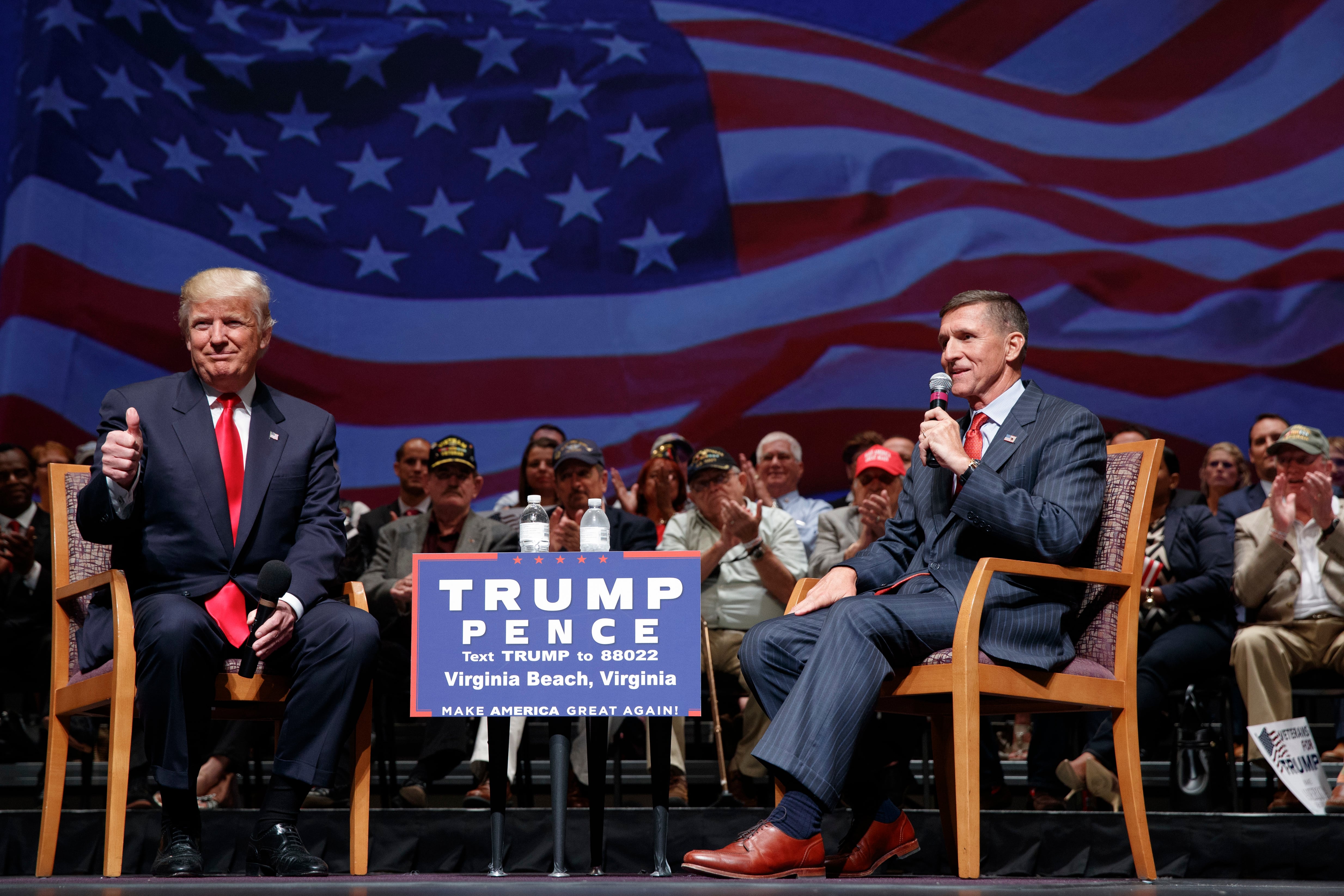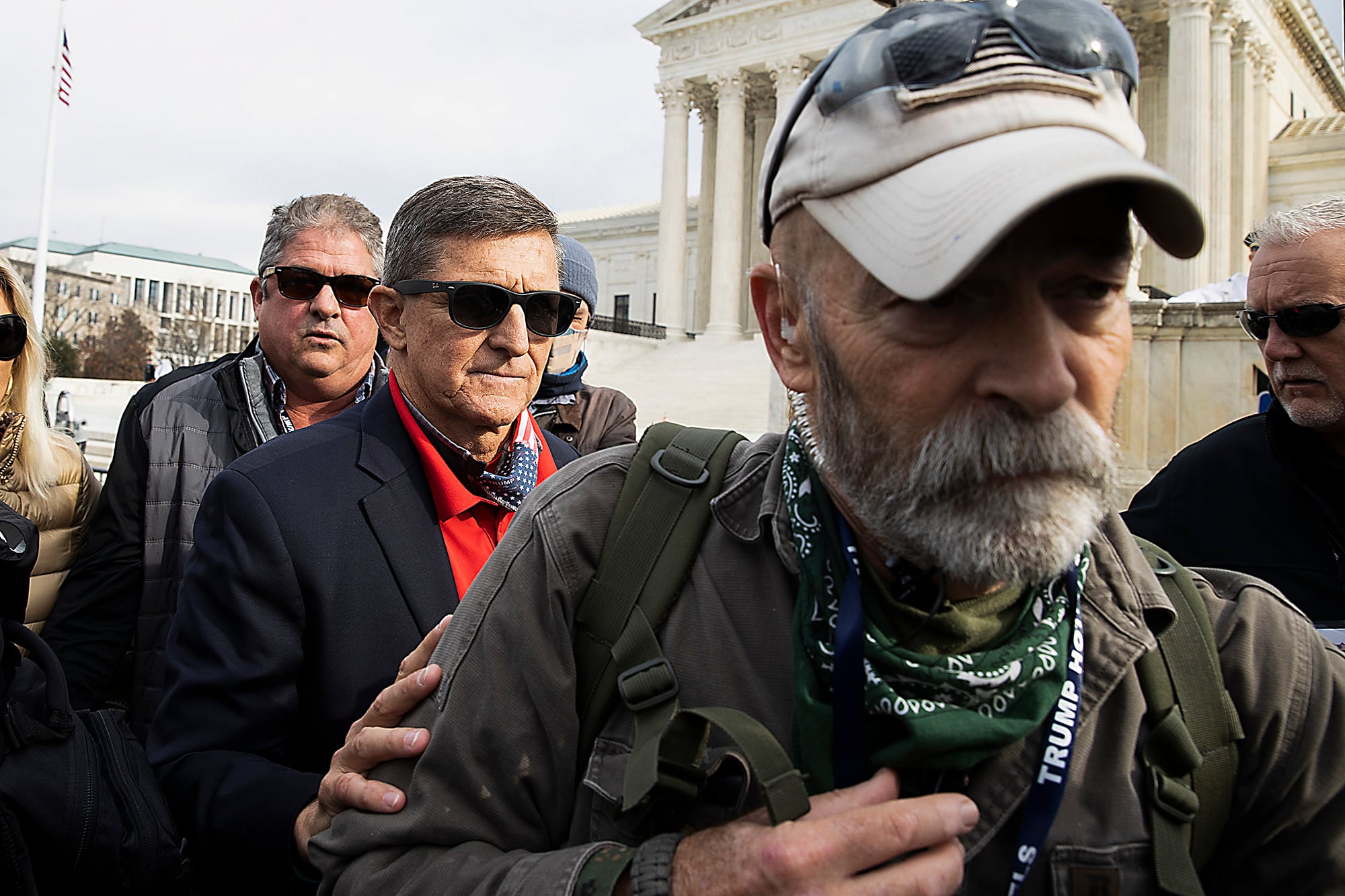Less than two weeks after being pardoned, retired Lt. Gen. Michael Flynn took to the airwaves to suggest President Trump could impose martial law and deploy the military to re-run the election. Apparently, this proposal intrigued President Trump, who invited Flynn to the White House to hear more. According to most accounts, Trump did not embrace the ideas further, once he heard other advisers and government lawyers argue forcefully against the proposal. But the fact they were ever raised and entertained is extraordinarily alarming.
By expressing these views publicly and in the Oval Office, Flynn tried to give the military the central role in determining the election outcome — a role the Constitution does not assign and that senior military leaders have been at pains to avoid for the past year. Flynn used his own rank and military status to lend credibility to ideas that are manifestly illegal and harmful to the Republic.
RELATED

Army Secretary Ryan McCarthy and Army Chief of Staff Gen. James McConville quickly responded by issuing a statement that implicitly disavowed both Flynn and his suggestion of martial law. They stated, “There is no role for the U.S. military in determining the outcome of an American election.” This statement echoed similar ones that Chairman of the Joint Chiefs of Staff Gen. Mark Milley has been making since the summer. A handful of retired generals and admirals have also criticized Flynn, but the overall response from this group has been muted, perhaps out of fear that such criticism could backfire by goading the President into taking this action precisely because he is being told he should not.
That fear is a reasonable one, but it is also worth noting that public shaming from his peers might help reign in Flynn and his irresponsible comments. Criticism from retired generals helped convince Milley to issue a remarkable public apology after his participation in a photo op with Trump at St. John’s Church after police cleared Lafayette Square using pepper spray and force.
Such shaming could also send important signals to the active-duty force. Our research suggests that condemnation by senior military leaders could markedly reduce veteran and military support for calls to invoke the Insurrection Act to overturn the results of the election.
In September and October, NORC conducted a representative survey of 4,500 Americans on our behalf (this data remains proprietary until we complete a book focused on public attitudes about the military). While our questions focused on the use of the Insurrection Act in response to domestic protests in general, they may provide insight to the current situation.
In our survey, approximately 42 percent of Americans told us they would support the deployment of active-duty troops within the United States to deal with continued protests of the sort seen over the summer. We also found large partisan differences, with 66 percent of Republicans expressing support compared to only 22 percent of Democrats.
Those who had served in the military were more likely than civilians to support the use of troops on domestic soil. Fifty-six percent of veterans stated they would support domestic deployments, while only 40 percent of civilians did the same.
Variation between veterans and civilians were largely the result of demographic differences, but we did observe one important difference in how veterans responded to public cues from senior military leaders.
In our survey, we included an experiment. A control group of 1,522 respondents received no additional information when asked about the Insurrection Act. Another group of 1,524 Americans also read a sentence stating that the chairman of the Joint Chiefs of Staff opposed invocation of the Insurrection Act. A final group of 1,464 respondents learned that the chairman supported the use of troops on domestic soil.
Among civilians, there were no real differences across these three groups. Roughly 40 percent of Americans supported use of the Insurrection Act regardless of messaging from the chairman.
Among veteran respondents, support from the chairman of the Joint Chiefs also had no significant effect. But opposition from the chairman reduced support among veterans by more than 8 points, from 57 percent to 49 percent. If Flynn continues his public calls for martial law, strong rebukes from other military leaders, active and retired, would likely reduce support for any such misadventure among veterans and service members.

Involving leaders in such a public debate does risk politicizing the military, but Flynn has already done this with his dangerous comments. If military leaders do not speak out, they risk some in the public interpreting their silence as tacit approval. Given the stakes, if there is any momentum in support of Flynn’s proposed misuse of the military, the more prudent course may be for current and former leaders to speak forthrightly, even if it raises their profile in the middle of a partisan fight they have been rightly trying to avoid.
Recent comments by Trump legal adviser Jenna Ellis suggest demands to use the military to overturn the election may be losing steam — at least for now. Responding to calls for martial law, Ellis tweeted, “We have a constitutional process for the Electoral College and remedies for corrupted elections. I totally understand Americans’ passion, but we have to uphold the law, not undermine it.”
The best outcome is for civilian officials, starting with President Trump, to rule any use of the military to determine the outcome of the election strictly out of bounds. But if there is any doubt, senior military leaders may be forced to make clear that Flynn does not speak for them. Our research suggests their condemnation would influence many veterans and some still in uniform.
Jim Golby is a senior fellow at the Clements Center for National Security at the University of Texas at Austin and co-host of the CSIS “Thank You For Your Service” podcast.
Peter D. Feaver is a professor of political science and public policy and director of the American Grand Strategy Program at Duke University.
Editor’s note: This is an Op-Ed and as such, the opinions expressed are those of the author. If you would like to respond, or have an editorial of your own you would like to submit, please contact Military Times managing editor Howard Altman, haltman@militarytimes.com.